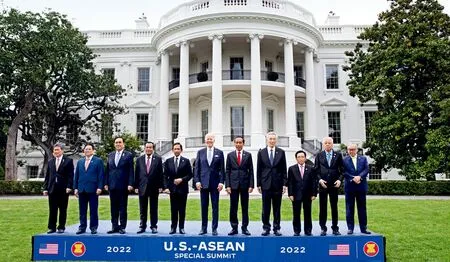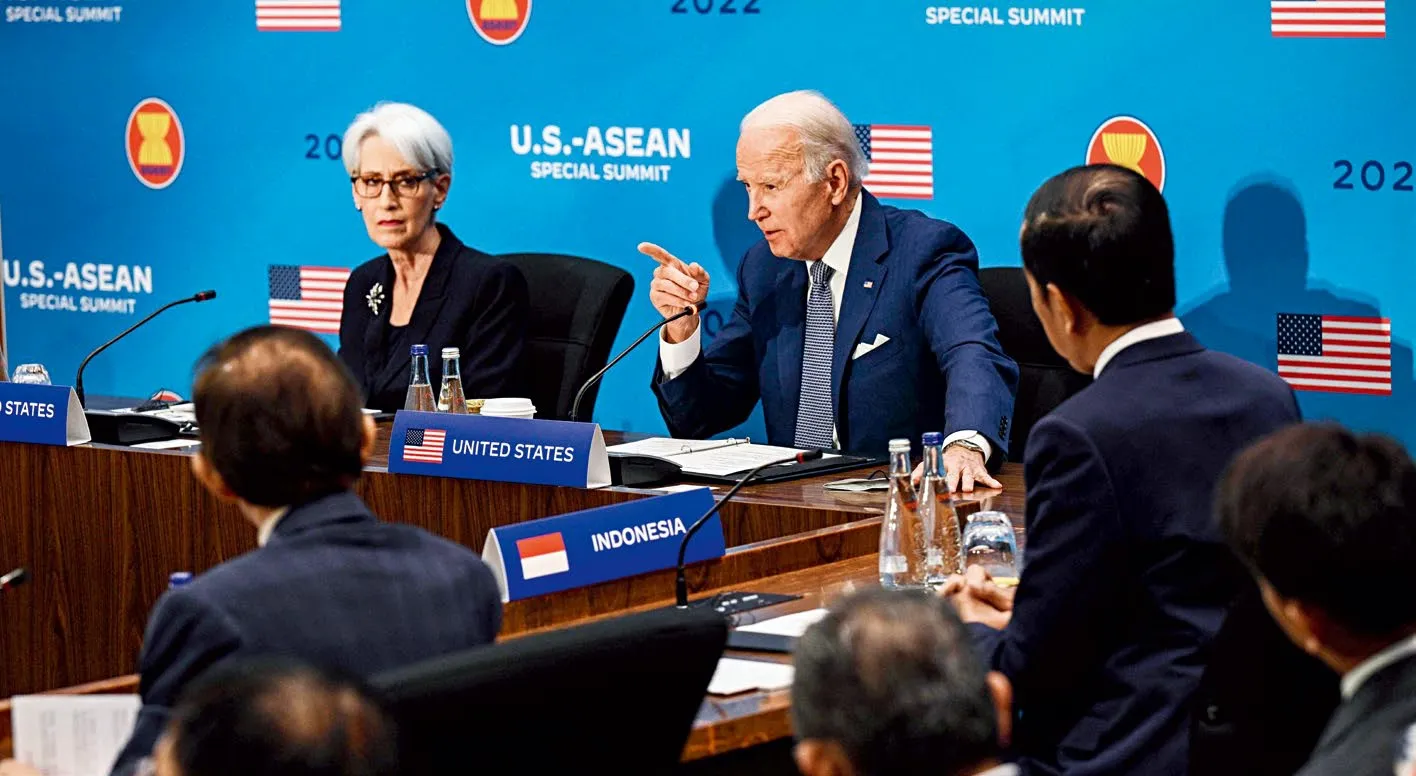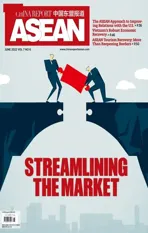The ASEAN Approach to Improving Relations with the U.S.
2022-06-23ByGeHongliang
By Ge Hongliang
Essentially,ASEAN’s diplomatic aim in its relations with America is to leverage its increasing value in competition between major countries

U.S.President Joe Biden participates in the U.S.-ASEAN Special Summit at the U.S.State Department in Washington,D.C.,on May 13,2022.(BRENDAN SMIALOWSKI)
On May 12 and 13,the U.S.-ASEAN Special Summit was held in the United States,the second such summit since 2016.The meeting,once“indefinitely postponed”by the White House,was the first chance for ASEAN leaders to meet U.S.President Joe Biden since he took office.The presidents of the Philippines and Myanmar were absent from the summit.
President Biden announced that the summit heralded a new era of partnership between the U.S.and ASEAN,and told the ASEAN leaders at the summit that“a great deal of history of our world in the next 50 years is going to be written in the ASEAN countries,and our relationship with you is the future,in the coming years and decades.”
According to the Joint Vision Statement released after the summit,the“new era”President Biden mentioned will be represented by a“meaningful,substantive,and mutually beneficial”ASEAN-U.S.Comprehensive Strategic Partnership (CSP) which ASEAN pledged to establish by the 10th ASEAN-U.S.Summit in November 2022.
However,the grand words in Biden’s remarks did not align exactly with the country’s financial support.President Biden announced only US$150 million in initiatives to deepen relations with ASEAN,a sharp contrast to the US$40 billion Ukraine aid bill he just signed.Many in the international community criticized Biden for paying mere lip service to ASEAN.
Still,ASEAN promised to upgrade the ASEAN-U.S.relations to a CSP—a cooperative relationship that is neither allied nor united against a third party—for its own interests.A CSP has three distinct characteristics:First,it defines the sides as partners rather than opponents or rivals.Second,a CSP is not expedient;it is supposed to be a relationship that is allencompassing and long-lasting.Third,such a partnership is of constructive significance;it neither demands exclusivity nor targets a third party.
ASEAN chose to make those promises because of the nature and features of the agreement.
The ASEAN Approach
ASEAN’s promise to upgrade the ASEAN-U.S.relations is consistent with the logic of the“ASEAN approach.”
The“ASEAN approach”refers to the consultation and decisionmaking approaches gradually formed based on regional cultures since the establishment of the regional bloc.It is characterized by consultative agreement and gradual progress,and ASEAN’s decision to boost ASEAN-U.S.relations is the embodiment of such“gradual progress.”
ASEAN has been following the principle of“gradual progress”when participating in regional and international affairs and coordinating relations among member countries.It stresses the importance of“comfort level,”making it a prerequisite for successful multilateral consultations and negotiations.It attaches importance to the negotiation framework and seeks to make gradual progress at a pace comfortable to all.

President Biden announced onlyUS$150 millionin initiatives to deepen relations with ASEAN,a sharp contrast to theUS$40 billionUkraine aid bill he just signed.
ASEAN’s promise to upgrade the ASEANU.S.relations is consistent with the logic of the“ASEAN approach.”
ASEAN has established CSPs with other major partners.In 2021,ASEAN entered into successive CSPs with Australia and China,which piqued the importance of ASEAN on the U.S.diplomatic agenda.
However,the upgrade lacks substantive significance for ASEAN countries.Critics had previously argued that the Biden government’s pivot of focus to Southeast Asia is more of a political and strategic consideration seeking gains on security issues without any attention to the local economy.And the summit did not do much to weaken such assertions.
Although the Joint Vision Statement announced that both sides would enhance cooperation on various issues including pandemic control,maritime flow,economics,connectivity,technological innovation,subregional cooperation,and climate change,a meager US$150 million investment and an“Indo-Pacific Economic Framework”of little pragmatic significance will hardly create the dynamics to drive substantive cooperation between ASEAN and the U.S.
Prayut Chan-o-cha,Prime Minister of Thailand,noted that the summit was an important turning point for implementing ASEAN-U.S.cooperation programs.Singapore’s Prime Minister Lee Hsien Loong,however,commented that boosting bilateral relations would depend on whether both sides could engage in substantive negotiations in the following months.
Essentially,ASEAN’s posturing while making the promise to upgrade relations with the U.S.evidenced its dissatisfaction with the current situation.Whether or not the Biden administration’s policies on Southeast Asia will make ASEAN countries“feel comfortable”remains to be seen.
Concerns about Uncertainty
ASEAN’s promise to upgrade the ASEAN-U.S.relations is consistent with the region’s objective to seek long-term and steady development of the relationship with the U.S.
Many American analysts agree that U.S.-ASEAN relations dipped to their lowest point during the Trump administration because the U.S.government lacked consistent policies for Southeast Asia.Trump was absent from the East Asia Summit and did not dispatch an ambassador to ASEAN throughout his entire term in office.
Those four years gave ASEAN countries plenty of time to worry about the uncertainty of its future relationship with the U.S.In the Special Summit’s statement,ASEAN stated“our cooperation has long been indispensable to ASEAN.”ASEAN hopes that the Biden government does pivot focus to Southeast Asia and guarantees the consistency of dialogue and cooperation between the U.S.and ASEAN.

U.S.President Joe Biden (center) poses with leaders from the ASEAN member states for a group photo on the South Lawn of the White House in Washington,D.C.,on May 12,2022.(MICHAEL REYNOLDS)

U.S.President Joe Biden participates in the U.S.-ASEAN Special Summit at the U.S.State Department in Washington,D.C.,on May 13,2022.(BRENDAN SMIALOWSKI)
Some scholars from Southeast Asia have already expressed concerns about the uncertainty of the bilateral relationship.“It is not a deterioration of the ASEAN-U.S.relationship that is the real concern here,”wrote Thomas Daniel,senior researcher at the Institute of Strategic &International Studies (ISIS) Malaysia,on May 2.“Rather,it is risk of stagnation or the lack of progress.And there are teething signs that the relationship is not moving as well as it could.”
Navigating Major Country Competition
ASEAN’s promise to upgrade ASEAN-U.S.relations is consistent with its past methods to navigate competition between major countries.
When the world undergoes competition between major powers,it tends to cause instability,uncertainty,and insecurity in regional and international situations.But ASEAN is familiar with such competition after consistently serving as a critical platform to navigate major country competition and safeguard regional peace since its establishment.
ASEAN has regularly turned to four strategies to mediate competition and guarantee regional peace.
First,it has been building the ASEAN Community to strengthen its capability and resilience in the face of uncertainties and challenges.
Second,it has been stressing ASEAN’s code of conduct.ASEAN asks its member countries and dialogue partners to follow its important regional documents on code of conduct including the Treaty of Amity and Cooperation in Southeast Asia,the Zone of Peace,Freedom and Neutrality (ZOPFAN),the Southeast Asian Nuclear-Weapon-Free Zone Treaty,and the Declaration of the East Asia Summit on the Principles for Mutually Beneficial Relations.
Third,it keeps focus on the ASEAN Framework and ASEAN centrality with an aim to facilitate constructive engagement between ASEAN countries and partners.That point has been expressed in the ASEAN Outlook on the Indo-Pacific adopted in 2019.A key document guiding ASEAN’s participation in regional cooperation,the ASEAN Outlook on the Indo-Pacific highlights ASEAN’s central role and regional influence,opposes exclusive competition,and promotes inclusive development.
Fourth,firmly it upholds multilateralism.
In this context,ASEAN pledging to boost relations with the U.S.should be expected after it established CSPs with Australia and China.
For ASEAN,its relationship with the U.S.is essentially an extension of its regional multilateral framework that guarantees ASEAN centrality,which requires the U.S.to continue supporting construction of the ASEAN Community and demonstrate greater sincerity in promises to observe the ASEAN code of conduct.It seeks to promote more inclusiveness,equality,and the spirit of multilateralism,as promoted in the ASEAN Outlook on the Indo-Pacific and in American implementation of regional strategies.Singapore’s Prime Minister Lee Hsien Loong made it clear that the Indo-Pacific Economic Framework,an important agenda during the Special Summit,must be inclusive.
The development is logically consistent with ASEAN’s commitment to boosting ASEAN-U.S.relations.Essentially,it was ASEAN’s diplomatic choice to navigate relations with America and secure greater value in competition between major countries.
